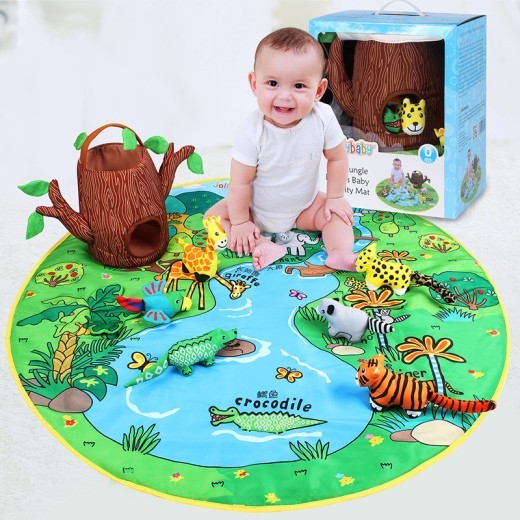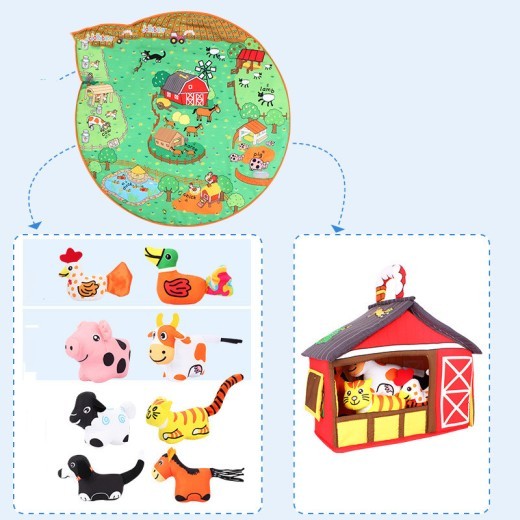Different Ways Of Stimulating Brain Development In Children


Street View Building Super Cathedral Is Compatible With Puzzle Toys
Gift Tree
Approx $1,196.20 USD


Baby Baby Play Blanket Early Education Animal Toys
Gift Tree
Approx $118.12 USD
Different Ways of Stimulating Brain Development in Children
Introduction
Brain development in children is a crucial aspect of their overall growth and future success. Parents, educators, and caregivers play an essential role in shaping cognitive abilities from an early age. By incorporating stimulating activities, the right nutrition, and an engaging environment, children can develop strong neural connections that support learning, creativity, and problem-solving.
In this guide, we will explore various ways to stimulate brain development in children, including activities, lifestyle choices, and learning techniques that foster cognitive growth.
The Importance of Early Brain Development
A child's brain undergoes rapid growth in the first few years of life. Research suggests that about 90% of brain development happens before the age of five. During this time, neural connections are formed through experiences, interactions, and stimuli.
Providing a nurturing environment with a variety of enriching activities helps to enhance cognitive abilities, emotional intelligence, and social skills. The experiences children have in their early years significantly impact their academic success and overall well-being.
Effective Ways to Stimulate Brain Development in Children
Engaging in Interactive Play
Play is a fundamental part of childhood and a powerful tool for brain development. Interactive play encourages problem-solving, creativity, and social skills.
- Building Blocks & Puzzles – These help in developing spatial awareness, problem-solving, and fine motor skills.
- Role-Playing Games – Pretend play encourages imagination, communication, and social development.
- Board Games – Strategic games enhance logical thinking, memory, and patience.
Encouraging Reading from an Early Age
Reading is one of the most effective ways to stimulate brain development. It strengthens language skills, comprehension, and cognitive abilities.
- Reading Aloud to Children – This enhances listening skills, vocabulary, and imagination.
- Introducing Age-Appropriate Books – Exposure to different stories and topics broadens knowledge and creativity.
- Discussing Stories – Asking questions and talking about the story improves comprehension and critical thinking.
Providing a Stimulating Environment
A child’s surroundings significantly impact brain development. A stimulating environment filled with learning materials, social interactions, and creative opportunities fosters cognitive growth.
- Music & Arts Exposure – Engaging in music and arts promotes creativity, emotional expression, and cognitive skills.
- Sensory Play – Activities like playing with sand, water, or textured objects enhance sensory processing.
- Outdoor Exploration – Nature walks, gardening, and physical play encourage curiosity and problem-solving.
Encouraging Physical Activity
Physical movement is closely linked to brain development. Exercise increases blood flow to the brain, supporting memory, concentration, and overall mental well-being.
- Dancing & Movement Games – Improves coordination and balance.
- Sports & Outdoor Activities – Enhances motor skills, teamwork, and strategic thinking.
- Yoga & Mindfulness – Helps with emotional regulation, focus, and relaxation.
Promoting Healthy Nutrition
Nutrition plays a vital role in brain function and development. A well-balanced diet rich in essential nutrients supports cognitive growth and learning abilities.
- Omega-3 Fatty Acids – Found in fish, nuts, and seeds, these are essential for brain health.
- Iron-Rich Foods – Iron supports oxygen transport to the brain and enhances focus.
- Antioxidants – Found in fruits and vegetables, these protect brain cells from damage.
Encouraging Curiosity & Problem-Solving
Children naturally have a curious mindset, and fostering this curiosity helps in brain development. Providing challenges and open-ended questions encourages critical thinking and problem-solving skills.
- STEM Activities – Science, technology, engineering, and math-based projects promote logical reasoning.
- Asking "Why" and "How" Questions – Encourages analytical thinking and exploration.
- Creative Problem-Solving Tasks – Games and experiments that require finding solutions enhance cognitive flexibility.
Developing Social & Emotional Intelligence
Social interactions and emotional intelligence are crucial for cognitive growth. Teaching children how to understand emotions, communicate effectively, and build relationships strengthens their brain development.
- Encouraging Group Activities – Helps with teamwork, empathy, and social bonding.
- Teaching Emotional Regulation – Simple mindfulness techniques help in managing stress and emotions.
- Practicing Positive Reinforcement – Builds self-esteem and confidence in learning.
Reducing Screen Time & Encouraging Hands-On Learning
While technology has its benefits, excessive screen time can negatively impact brain development. Encouraging hands-on learning experiences ensures active engagement and cognitive growth.
- Limiting Passive Screen Time – Reduce time spent on TV and non-interactive digital activities.
- Engaging in Educational Apps & Games – When using technology, opt for interactive and learning-based programs.
- Promoting Hands-On Activities – Encourage crafts, DIY projects, and real-world problem-solving tasks.
Ensuring Quality Sleep & Rest
Sleep is essential for brain development, memory retention, and cognitive function. A well-rested child performs better in learning and problem-solving tasks.
- Establishing a Bedtime Routine – Helps regulate sleep patterns and supports brain recovery.
- Providing a Comfortable Sleep Environment – A quiet, dark room enhances deep sleep.
- Avoiding Screens Before Bedtime – Blue light from screens disrupts melatonin production and sleep quality.
Conclusion
Brain development in children is influenced by a combination of engaging activities, proper nutrition, social interactions, and a nurturing environment. By incorporating these stimulating techniques into daily routines, parents and caregivers can enhance a child’s cognitive abilities, creativity, and overall intelligence.
Encouraging a love for learning, fostering curiosity, and providing enriching experiences from an early age pave the way for a bright and successful future.
Enter your content here





.jpg)









.jpg)





.jpeg)





.jpeg)



.jpeg)








.jpeg)



.jpeg)

.jpeg)

.jpeg)

.jpeg)




.jpeg)
.jpg)

.jpeg)






.jpeg)
.jpeg)




.jpeg)





.jpeg)


.jpeg)

.jpeg)

.jpeg)

.jpeg)







.jpeg)
.jpeg)
.jpeg)





.jpeg)



.jpeg)






.jpg)
.jpeg)









.jpg)


ulva-Logo.jpg)




.jpeg)



.png)















.png)
























